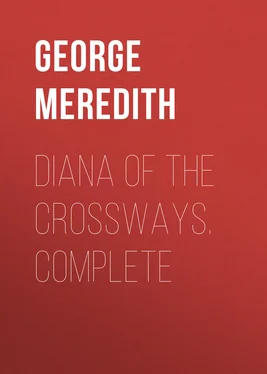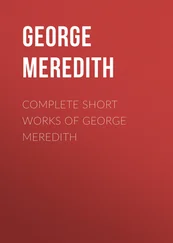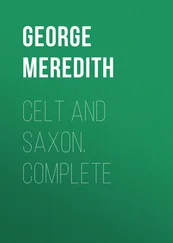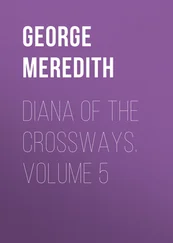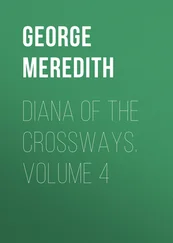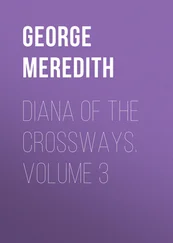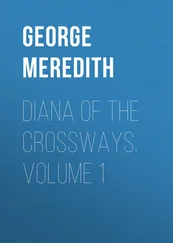George Meredith - Diana of the Crossways. Complete
Здесь есть возможность читать онлайн «George Meredith - Diana of the Crossways. Complete» — ознакомительный отрывок электронной книги совершенно бесплатно, а после прочтения отрывка купить полную версию. В некоторых случаях можно слушать аудио, скачать через торрент в формате fb2 и присутствует краткое содержание. Жанр: foreign_prose, literature_19, foreign_antique, на английском языке. Описание произведения, (предисловие) а так же отзывы посетителей доступны на портале библиотеки ЛибКат.
- Название:Diana of the Crossways. Complete
- Автор:
- Жанр:
- Год:неизвестен
- ISBN:нет данных
- Рейтинг книги:3 / 5. Голосов: 1
-
Избранное:Добавить в избранное
- Отзывы:
-
Ваша оценка:
- 60
- 1
- 2
- 3
- 4
- 5
Diana of the Crossways. Complete: краткое содержание, описание и аннотация
Предлагаем к чтению аннотацию, описание, краткое содержание или предисловие (зависит от того, что написал сам автор книги «Diana of the Crossways. Complete»). Если вы не нашли необходимую информацию о книге — напишите в комментариях, мы постараемся отыскать её.
Diana of the Crossways. Complete — читать онлайн ознакомительный отрывок
Ниже представлен текст книги, разбитый по страницам. Система сохранения места последней прочитанной страницы, позволяет с удобством читать онлайн бесплатно книгу «Diana of the Crossways. Complete», без необходимости каждый раз заново искать на чём Вы остановились. Поставьте закладку, и сможете в любой момент перейти на страницу, на которой закончили чтение.
Интервал:
Закладка:
‘I’m always glad of the signal,’ said Diana.
He had implied the people of the two islands. He allowed her interpretation to remain personal, for the sake of a creeping deliciousness that it carried through his blood.
‘Shall you soon be returning to England?’ he ventured to ask.
‘I am Lady Dunstane’s guest for some months.’
‘Then you will. Sir Lukin has an estate in Surrey. He talks of quitting the Service.’
‘I can’t believe it!’
His thrilled blood was chilled. She entertained a sentiment amounting to adoration for the profession of arms!
Gallantly had the veteran General and Hero held on into the night, that the festivity might not be dashed by his departure; perhaps, to a certain degree, to prolong his enjoyment of a flattering scene. At last Sir Lukin had the word from him, and came to his wife. Diana slipped across the floor to her accommodating chaperon, whom, for the sake of another five minutes with her beloved Emma, she very agreeably persuaded to walk in the train of Lord Larrian, and forth they trooped down a pathway of nodding heads and curtsies, resembling oak and birch-trees under a tempered gale, even to the shedding of leaves, for here a turban was picked up by Sir Lukin, there a jewelled ear-ring by the self-constituted attendant, Mr. Thomas Redworth. At the portico rang a wakening cheer, really worth hearing. The rain it rained, and hats were formless,’ as in the first conception of the edifice, backs were damp, boots liquidly musical, the pipe of consolation smoked with difficulty, with much pulling at the stem, but the cheer arose magnificently, and multiplied itself, touching at the same moment the heavens and Diana’s heart-at least, drawing them together; for she felt exalted, enraptured, as proud of her countrymen as of their hero.
‘That’s the natural shamrock, after the artificial!’ she heard Mr. Redworth say, behind her.
She turned and sent one of her brilliant glances flying over him, in gratitude for a timely word well said. And she never forgot the remark, nor he the look.
CHAPTER IV. CONTAINING HINTS OF DIANA’S EXPERIENCES AND OF WHAT THEY LED TO
A fortnight after this memorable Ball the principal actors of both sexes had crossed the Channel back to England, and old Ireland was left to her rains from above and her undrained bogs below; her physical and her mental vapours; her ailments and her bog-bred doctors; as to whom the governing country trusted they would be silent or discourse humorously.
The residence of Sir Lukin Dunstane, in the county of Surrey, inherited by him during his recent term of Indian services, was on the hills, where a day of Italian sky, or better, a day of our breezy South-west, washed from the showery night, gives distantly a tower to view, and a murky web, not without colour: the ever-flying banner of the metropolis, the smoke of the city’s chimneys, if you prefer plain language. At a first inspection of the house, Lady Dunstane did not like it, and it was advertized to be let, and the auctioneer proclaimed it in his dialect. Her taste was delicate; she had the sensitiveness of an invalid: twice she read the stalking advertizement of the attractions of Copsley, and hearing Diana call it ‘the plush of speech,’ she shuddered; she decided that a place where her husband’s family had lived ought not to stand forth meretriciously spangled and daubed, like a show-booth at a fair, for a bait; though the grandiloquent man of advertizing letters assured Sir Lukin that a public agape for the big and gaudy mouthful is in no milder way to be caught; as it is apparently the case. She withdrew the trumpeting placard. Retract we likewise ‘banner of the metropolis.’ That plush of speech haunts all efforts to swell and illuminate citizen prose to a princely poetic.
Yet Lady Dunstane herself could name the bank of smoke, when looking North-eastward from her summerhouse, the flag of London: and she was a person of the critical mind, well able to distinguish between the simple metaphor and the superobese. A year of habitation induced her to conceal her dislike of the place in love: cat’s love, she owned. Here, she confessed to Diana, she would wish to live to her end. It seemed remote, where an invigorating upper air gave new bloom to her cheeks; but she kept one secret from her friend.
Copsley was an estate of nearly twelve hundred acres, extending across the ridge of the hills to the slopes North and South. Seven counties rolled their backs under this commanding height, and it would have tasked a pigeon to fly within an hour the stretch of country visible at the Copsley windows. Sunrise to right, sunset leftward, the borders of the grounds held both flaming horizons. So much of the heavens and of earth is rarely granted to a dwelling. The drawback was the structure, which had no charm, scarce a face. ‘It is written that I should live in barracks,’ Lady Dunstane said. The colour of it taught white to impose a sense of gloom. Her cat’s love of the familiar inside corners was never able to embrace the outer walls. Her sensitiveness, too, was racked by the presentation of so pitiably ugly a figure to the landscape. She likened it to a coarse-featured country wench, whose cleaning and decorating of her countenance makes complexion grin and ruggedness yawn. Dirty, dilapidated, hung with weeds and parasites, it would have been more tolerable. She tried the effect of various creepers, and they were as a staring paint. What it was like then, she had no heart to say.
One may, however, fall on a pleasurable resignation in accepting great indemnities, as Diana bade her believe, when the first disgust began to ebb. ‘A good hundred over there would think it a Paradise for an asylum’: she signified London. Her friend bore such reminders meekly. They were readers of books of all sorts, political, philosophical, economical, romantic; and they mixed the diverse readings in thought, after the fashion of the ardently youthful. Romance affected politics, transformed economy, irradiated philosophy. They discussed the knotty question, Why things were not done, the things being confessedly to do; and they cut the knot: Men, men calling themselves statesmen, declined to perform that operation, because, forsooth, other men objected to have it performed on them. And common humanity declared it to be for the common weal! If so, then it is clearly indicated as a course of action: we shut our eyes against logic and the vaunted laws of economy. They are the knot we cut; or would cut, had we the sword. Diana did it to the tune of Garryowen or Planxty Kelly. O for a despot! The cry was for a beneficent despot, naturally: a large-minded benevolent despot. In short, a despot to obey their bidding. Thoughtful young people who think through the heart soon come to this conclusion. The heart is the beneficent despot they would be. He cures those miseries; he creates the novel harmony. He sees all difficulties through his own sanguine hues. He is the musical poet of the problem, demanding merely to have it solved that he may sing: clear proof of the necessity for solving it immediately.
Thus far in their pursuit of methods for the government of a nation, to make it happy, Diana was leader. Her fine ardour and resonance, and more than the convincing ring of her voice, the girl’s impassioned rapidity in rushing through any perceptible avenue of the labyrinth, or beating down obstacles to form one, and coming swiftly to some solution, constituted her the chief of the pair of democratic rebels in questions that clamoured for instant solution. By dint of reading solid writers, using the brains they possessed, it was revealed to them gradually that their particular impatience came perhaps of the most earnest desire to get to a comfortable termination of the inquiry: the heart aching for mankind sought a nest for itself. At this point Lady Dunstane took the lead. Diana had to be tugged to follow. She could not accept a ‘perhaps’ that cast dubiousness on her disinterested championship. She protested a perfect certainty of the single aim of her heart outward. But she reflected. She discovered that her friend had gone ahead of her.
Читать дальшеИнтервал:
Закладка:
Похожие книги на «Diana of the Crossways. Complete»
Представляем Вашему вниманию похожие книги на «Diana of the Crossways. Complete» списком для выбора. Мы отобрали схожую по названию и смыслу литературу в надежде предоставить читателям больше вариантов отыскать новые, интересные, ещё непрочитанные произведения.
Обсуждение, отзывы о книге «Diana of the Crossways. Complete» и просто собственные мнения читателей. Оставьте ваши комментарии, напишите, что Вы думаете о произведении, его смысле или главных героях. Укажите что конкретно понравилось, а что нет, и почему Вы так считаете.
